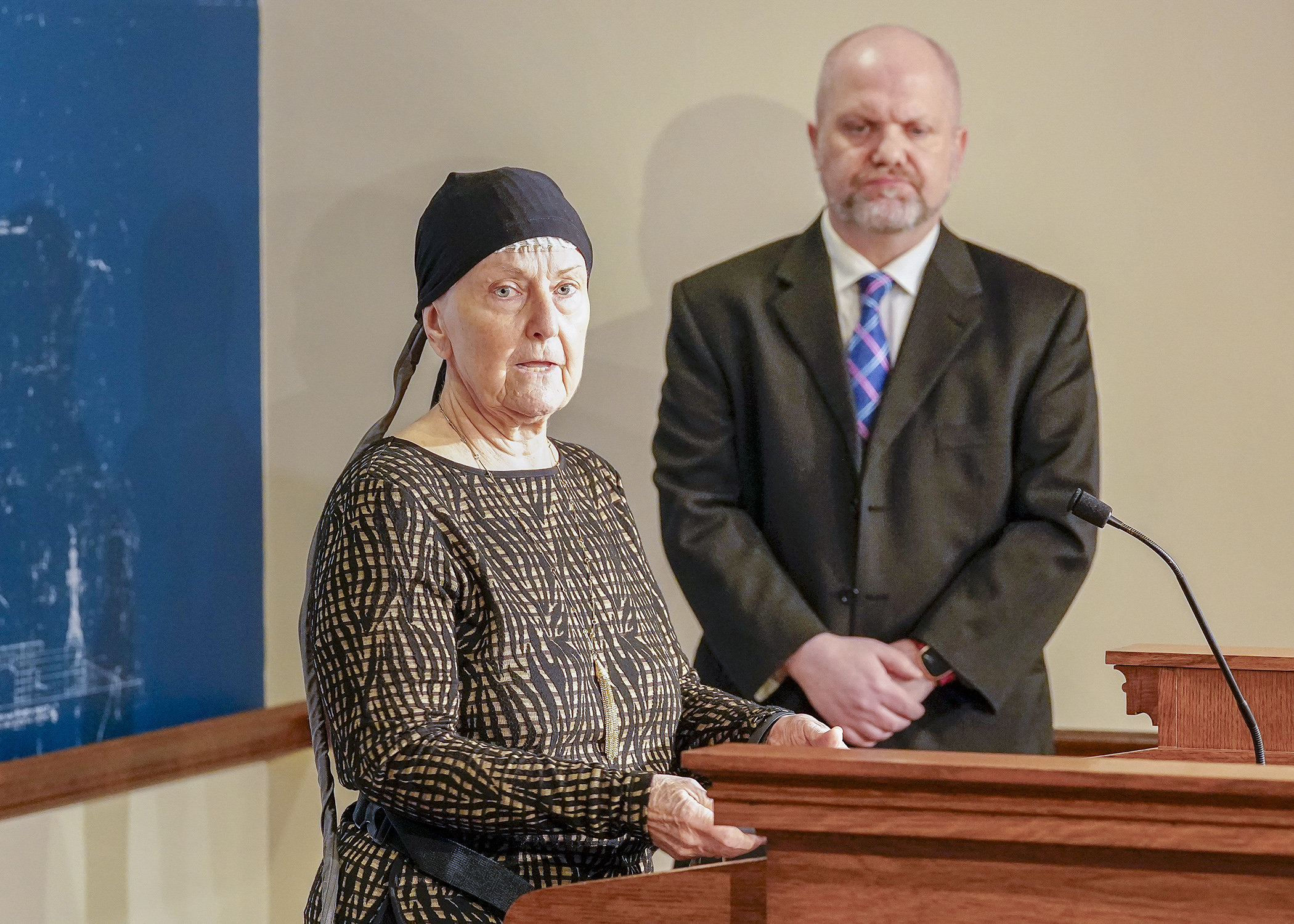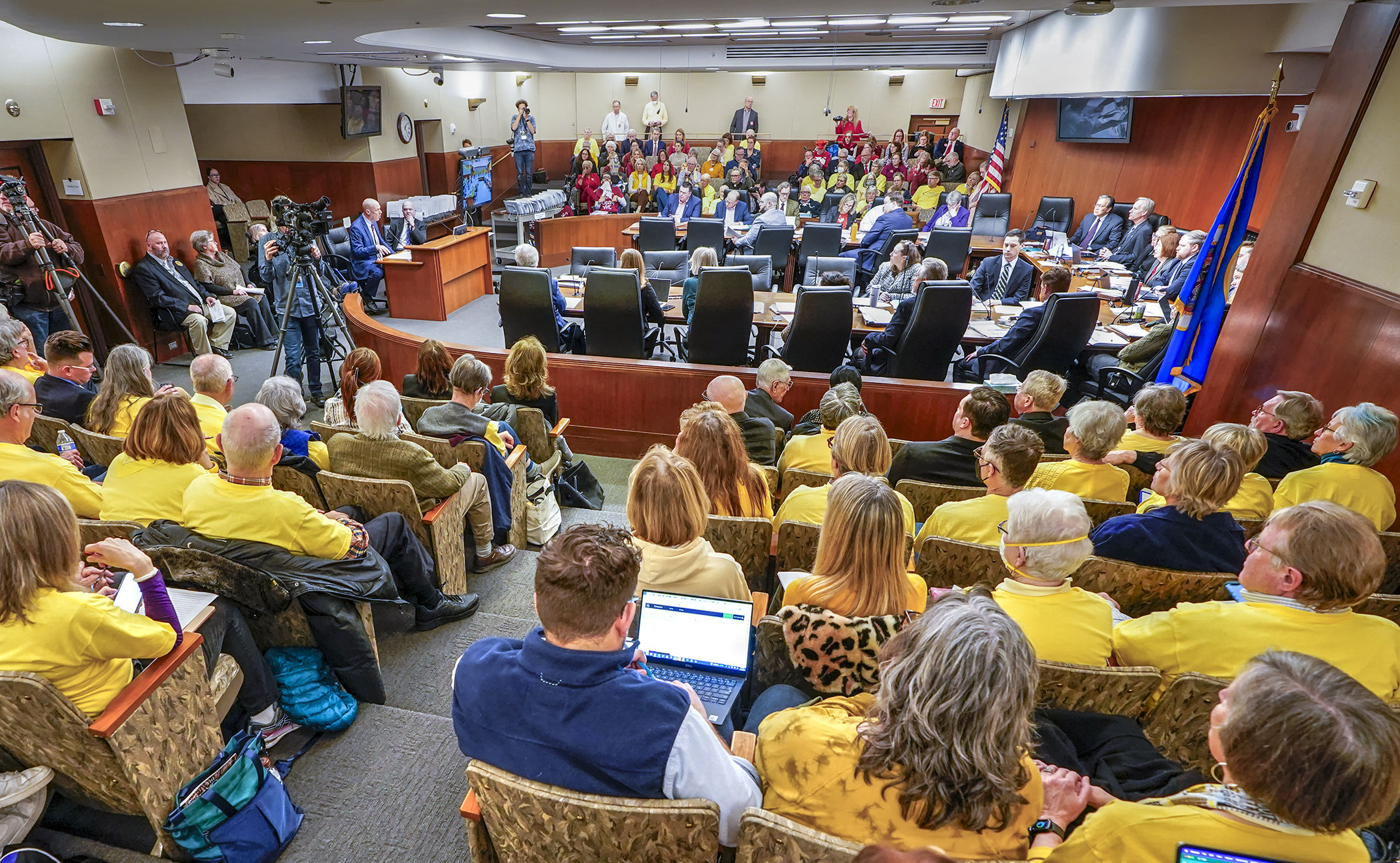Dozens testify as House committee approves End-of-Life Option Act

In November 2022, Nancy Uden had a seizure while driving that caused an accident she couldn’t remember when she woke in the hospital. Further tests revealed the Corcoran resident has an aggressive form of brain cancer with no cure and a median survival rate of 15 months.
She has since undergone many treatments for the disease and told the House Health Finance and Policy Committee Thursday she promised her family to fight until there is no hope left and death is inevitable.
When Uden arrives at that point, however, she hopes the Legislature will have by then passed a bill she believes will help. Uden would like the option to end her own life and die peacefully and painlessly rather than suffering.
“If there are no more treatment options, then I deserve more death options,” Uden said. “I am not afraid of death, but I am afraid of how I will die.”
Her story was one of many shared by testifiers both for and against HF1930, a bill that would allow people to request medical aid in dying under certain circumstances.
After several hours of emotional testimony, the committee adopted a delete-all amendment to the bill, approved it on a 10-5 party-line vote, and referred it, as further amended, to the House Public Safety Finance and Policy Committee — an action that will have to wait until the 2024 legislative session begins Feb. 12.
Called the “End-of-Life Option Act” in the proposed legislation, it would allow an individual to request medical aid in dying medication provided certain requirements are met. Among those are the person:
- is at least 18 years of age;
- has a terminal disease with a prognosis of no more than six months to live;
- is determined to be mentally capable as defined in statute; and
- is not subject to guardianship or conservatorship.
The bill’s sponsor, Rep. Mike Freiberg (DFL-Golden Valley), said HF1930 emphasizes personal autonomy at the end of life.
Freiberg said he’s heard from many Minnesotans who either had loved ones dying from a terminal illness or were dying themselves and wanted the option of ending their suffering when it becomes unbearable.
“This bill will give them that option,” he said.
House Minority Leader Lisa Demuth (R-Cold Spring) issued a statement accusing House DFL members of “pushing forward another extreme bill to end life” rather than focusing on issues such as family budgets or school resource officers.
“Every life has value and we've seen a disturbing and slippery slope for programs like these in other states and countries,” she wrote. “… House Republicans will stand on the side of life and will work towards building a culture that values every human life in Minnesota.”
 The House Health Finance and Policy Committee and a capacity audience listened Jan. 25 to testimony — some very emotional — on HF1930, a bill that would establish end-of-life options for terminally ill adults. (Photo by Andrew VonBank)
The House Health Finance and Policy Committee and a capacity audience listened Jan. 25 to testimony — some very emotional — on HF1930, a bill that would establish end-of-life options for terminally ill adults. (Photo by Andrew VonBank)An individual would be required to make one oral request and one written request to their attending provider for medical aid in dying medication, along with one oral request to a consulting provider. The requests could only be made by the person who would self-administer the medication.
The bill further details responsibilities and qualifications for providers as well as licensed mental health professionals and pharmacists but would not require participation from anyone. It would also provide immunity from criminal and civil liability, or other professional disciplinary action, for individuals who engage in “good faith compliance” with the law.
Republican committee members unsuccessfully offered a handful of amendments.
Support and opposition
Dozens of supporters and opponents testified during the four-plus hour hearing and many others submitted written testimony.
That included a 2023 report from Compassion & Choices, a nonprofit organization that advocates for aid in dying, that compiled data from most jurisdictions in the United States where medical aid in dying has been authorized, including: Oregon, Washington, Vermont, California, Colorado, Hawaii, New Jersey, Maine and the District of Columbia.
Among the conclusions its authors drew were that over “the past 20+ years across all jurisdictions, 6,378 people have used a medical aid in dying prescription to end their suffering” and that 37% of people who obtain the medication never take it.
“However, they derive peace of mind simply from knowing they have the option if their suffering becomes too great,” the organization wrote. “Less than 1% of the people who die in each jurisdiction use the law each year.”
But opponents raised a variety of objections.
The Citizens’ Council for Health Freedom, a nonprofit health policy organization founded in Minnesota “to protect patient and doctor freedom,” said it would result in a lowered standard of care for patients, corrupt the practice of medicine and pressure patients who feel they have become a burden to end their lives.
“This bill is moving to create two classes of suicide: good suicide and bad suicide – and forcing practitioners to tacitly participate,” wrote Twila Brase, the council’s president and cofounder.
Cathy Blaeser, co-executive director of Minnesota Citizens Concerned for Life, said the bill would lead to the abandonment of the most vulnerable patients and that ”offering death” as a solution to problems is ignoring a cry for help and not addressing the root causes of suffering.
“Instead of improving palliative and hospice care, Minnesota will simply offer a deadly cocktail,” she said.
Related Articles
Search Session Daily
Advanced Search OptionsPriority Dailies
Speaker Emerita Melissa Hortman, husband killed in attack
By HPIS Staff House Speaker Emerita Melissa Hortman (DFL-Brooklyn Park) and her husband, Mark, were fatally shot in their home early Saturday morning.
Gov. Tim Walz announced the news dur...
House Speaker Emerita Melissa Hortman (DFL-Brooklyn Park) and her husband, Mark, were fatally shot in their home early Saturday morning.
Gov. Tim Walz announced the news dur...
Lawmakers deliver budget bills to governor's desk in one-day special session
By Mike Cook About that talk of needing all 21 hours left in a legislative day to complete a special session?
House members were more than up to the challenge Monday. Beginning at 10 a.m...
About that talk of needing all 21 hours left in a legislative day to complete a special session?
House members were more than up to the challenge Monday. Beginning at 10 a.m...